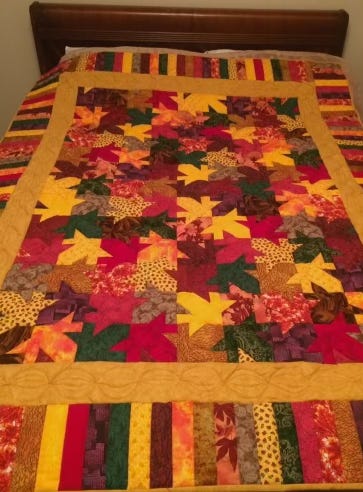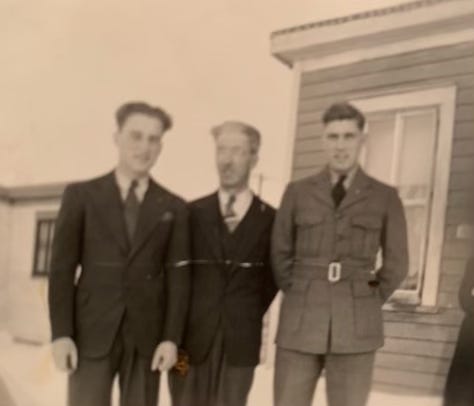November is always the month of remembering the call and the gift of those who fought and died for democracy. In this piece I want to honour those veterans but I would also like to dedicate this essay to those who have always served, supported, and cared for veterans in Canada. There are public servants, not for profit organizations, and community service providers who have cared for our vets over many, many years. One of my colleagues, Karen Bonner, spent most of her public service career with veterans. She and I spent two hours on the phone on November 11th, talking about war, conflicts, and veterans. Years ago, she reflected on being a young woman working with older vets. Years later, the vets became younger. Thank you, Karen.
I wrote a song about this. Listen here.
So.
I am writing this piece at my kitchen table on November 11, 2024, our day of remembrance.
I quietly took that moment of silence, then I called my dear friend and colleague, Karen Bonner, who spent twenty-one dedicated public service years with Veterans Affairs. We had a deep conversation about vets and wars and honour and service that left me a bit wrung out, but once again recognizing the power of honest conversations in turbulent times.
I was born in 1947. The war was won. We celebrated the victory in many ways but the most common and lasting celebration seemed to be making a lot of babies.
My grandfather, my father, and my uncle were all vets.
They had similar stories. My grandfather signed up for the first war. He was a tough guy; a Montreal cop and he was eager to join the battle in Europe. He made it overseas but got very sick in England and was sent home. He then joined the Royal North West Mounted Police and was sent west to Depot in Regina.
That is another story coming soon.
My dad was pretty young but he wanted in.
He took his basic training, hardened up and as he always said, learned how to fall, how to fight and how to make his bed. Days before he was to head overseas, like his dad, he got sick and they put him in a hospital not on the troop train.
Upon his discharge he came home and like his father, tried to join the RCMP. He was tough, smart and ready to deal with bad guys but the Mounties wanted their men to be a half inch taller than he was.
My uncle Bud made it and served well overseas, came home and became a preacher in the indigenous communities.
So, I am from a family of would-be warriors but also a family often a little late to the game. They were crushed that they did not get to the front lines but on the other hand, I was pretty happy that my grandfather and dad were not buried overseas, crippled or shell-shocked like some of my friends’ dads.
Karen knew so many of those old gentlemen like my father. It was truly challenging and rewarding work to be a young woman spending her work days helping and serving these old veterans.
Later in her career she saw the reality of what a veteran was start to change some.
World War Two vets were older than her.
Contemporary vets were younger than her.
World War Two vets answered a call, a big call to save the world.
Contemporary vets were called to deal with some very specific bad guys and to protect woman and children.
World War Two vets knew when it was over, they could go back to family, the farm or factory.
Contemporary vets were mostly career soldiers returning to barracks, training and waiting for the next mission.
World War Two vets returned after a clear win and were hailed as victors with honor.
Contemporary vets’ deployments are often not seen as wins, and celebration and honours may not be coming.
World War Two vets fought in black and white.
Contemporary vets struggle to fight and understand in shades of grey.
There is such a gulf between a short-term calling and a long-term career but why do we treat both somewhat differently? I imagine that we have to be careful that we appreciate all who step up with the same honour as the many before them, but most of us remember the people spitting on the Vietnam vets.
One example of our slippage was the fact that after the Second World War we stopped giving out the Victoria Cross to vets, even after a Canadian vet campaign tried to bring it back.
I imagine honoring a towering moment of bravery whether or not the soldier is in a war or a conflict.
I imagine that having shrapnel tear through your body is the same in both wars.
I imagine parental loss and grief must be the same in both.
I knew two fathers, Mike and Tim. Mike was a colleague in the public service who got the call that his son’s convoy was blown up by a suicide bomber. His boy survived and is now fine. What is different is that he is haunted by a new form of PTSD: shrapnel from a suicide bomber contains more than metal parts entering your body.
Tim was a real leader in the world of indigenous education with me. I lost track of him but his story found me. Tim’s daughter Nicola was the first Canadian woman soldier to die in conflict. I read Tim’s comments in an interview where he said, “I don’t think war at any time, is worth the cost.” That being said his pride and honour of her service is beyond measure. He has gone into Afghanistan to train teachers, and his family has worked to help those Afghans who gave assistance to the Canadian military and who were left behind.
I asked Karen what she had learned from her 21 years in service to our veterans.
“I loved them,” she said quietly.
She sat with one old fella in Burma who was there at nineteen years old. “I came here to fight. I went home to work and raise a family and now here I am again.”
These men were selfless, she says. They did not go so much for talking about themselves, they would rather talk about their buddies.
They loved each other.
They did not see any difference between themselves and the young ones. They and their comrades would not be interested in differing definitions of what a veteran is and they were still into honoring all their comrades. When the department got some extra resources from Parliament, the old guys insisted they give it to the youngsters, she reflects. She recalls the vet culture appreciated what they had and were reluctant to ask for more, even if richly deserved.
They were storytellers, she remembers, but often reluctant. Still, after another sociable, the stories would come.
How are you? she asks one old gent. Take a look he says and drops to the floor for a couple of pushups.
They taught me the power of wit, she says. I was overseas with of group of vets. One of the boys had a few drinks and she tucked him into bed. Shall I give you a call in the morning? She inquires.
I would rather a nudge, he winks.
The sun is just now going down on this November 11th. I am grateful for my grandfather, my father, my uncle, my colleagues and the thousands of the men and women who answered the call and continue to keep their ears peeled for the next.
We are living in uncertain times. The young are hearing many calls, but they are now received in a toxic static of lies, disinformation, conspiracy theories, anger and fear. It will be hard for them to distinguish a true call for service from a false call for hate.

Those old vets were our generations’ elder’s circle. I should have talked to them more. They knew the difference. Perhaps today we need to search for their voice again and listen as hard as we can.






Thanks for this story and song, Bob. As always, you give my mind the gift of thoughts to chew.
Bob. Thank you for your wisdom and important words. I had a great-grandfather who was eager to get to the front and fight for Canada. Sadly, he died of a brain hemorrhage on the train from Alberta to Halifax. He fought in WWI and brought back an English bride and her 3 children, whose father died in France in WWI. My beloved grandfather Reg Austin was the oldest of the children. In WWII he was too old for active duty, so he worked as an airplane mechanic. I guess his experience working on various types of farm machinery made him qualified; kind of a scary thought looking back on it. He was proud of his service and went on to a life of service in the area of local politics. He truly was my hero, and I thank him every day for the courage he instilled in me to be myself, learn to speak in public and to be of service anytime I can. These days I volunteer for a women's shelter, WINGS of Providence, and participate in many aspects of community awareness and fund development. Take care ~ F